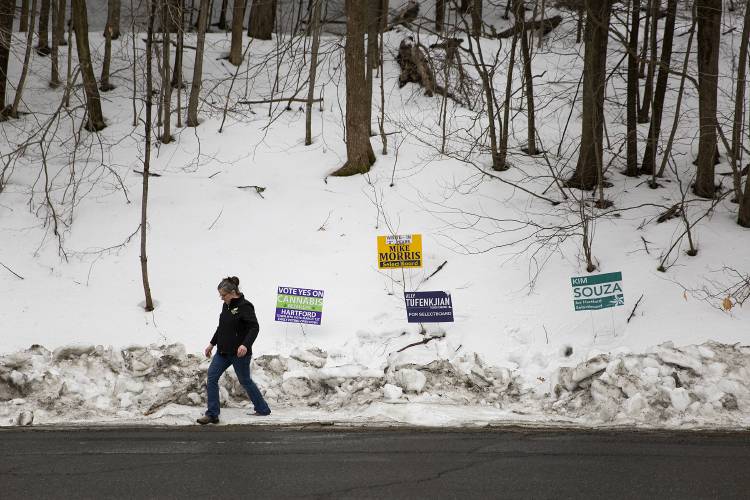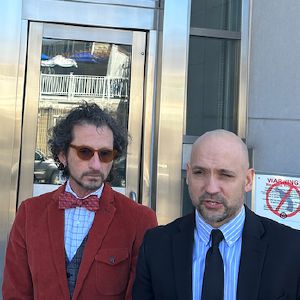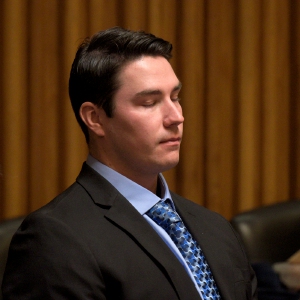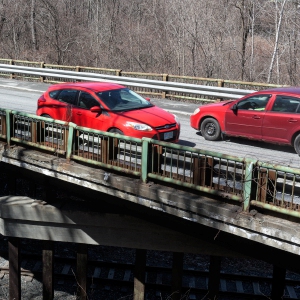Two Upper Valley towns ask voters for local option tax

White River Growpro co-owner Stephanie Waterman steps out of a snowbank after placing a sign urging voters to support the retail sale of cannabis in Hartford along VA Cutoff Road near U.S. Route 4 in White River Junction, Vt., on Thursday, Feb. 17, 2022. “Vermont is the Green Mountain State for more reason than one,” Waterman said, and she hopes that going forward there is less stigma attached to growing and using cannabis. (Valley News / Report For America - Alex Driehaus) Copyright Valley News. May not be reprinted or used online without permission. Send requests to permission@vnews.com. Alex Driehaus
| Published: 02-18-2025 7:01 PM |
HARTFORD — Facing rising costs of operation that are driving up property tax rates, two Upper Valley towns are asking voters to approve a 1% local options tax to augment municipal revenues.
The Hartford Selectboard in December unanimously voted to ask residents to approve a 1% local option retail sales tax after the same ballot issue narrowly failed last year.
“The price of doing business has gone up in these economic times. The budget is not full of unnecessary or wasteful spending and the idea that we can simply cut our way to more sustainable property tax rates is false,” Hartford Selectboard Chairman Mike Hoyt said by email Tuesday.
Elsewhere, Royalton will ask voters next month to approve a local option tax on meals, alcoholic beverages and rooms.
Since 2016, Hartford has collected a 1% local option tax on meals, alcoholic beverages and rooms.
In Town Meeting voting this year, Hartford voters will be asked whether they support spending revenue from the existing local option tax on several vehicles, including a pick-up truck and utility vehicle for the Parks & Recreation Department, a dump/plow truck for the Department of Public Works, and a cruiser for the Police Department, as well as rescue tools for the Fire Department.
If Hartford voters approve the new 1% retail tax, it would join Woodstock as the only other Upper Valley town to impose such a tax.
The local option retail tax would add 1% to Vermont’s 6% sales tax. The tax would apply to items purchased in Hartford’s five villages as well as any items purchased online that are subject to Vermont sales tax.
Article continues after...
Yesterday's Most Read Articles
 Federal judge temporarily reinstates legal status for Dartmouth graduate student
Federal judge temporarily reinstates legal status for Dartmouth graduate student
 Prosecutors seek prison term of at least 30 years for man convicted at Dartmouth rape trial
Prosecutors seek prison term of at least 30 years for man convicted at Dartmouth rape trial
 Former Dartmouth ski team member dies in accident in California
Former Dartmouth ski team member dies in accident in California
 West Lebanon bridge reopens to vehicles
West Lebanon bridge reopens to vehicles
 Upper Valley donut maven Muriel Maville dies at 87
Upper Valley donut maven Muriel Maville dies at 87
The local option retail tax would not apply to the sale or rental of motor vehicles or to food, clothing, medical supplies or over-the-counter medicines.
Proceeds from Hartford’s local option retail tax would be used exclusively to offset municipal property tax rates.
“One way to keep tax increases to a minimum is to find additional sources of revenue,” Hartford’s Hoyt said.
Had the local option tax been in effect this year, it would have produced an esti mated tax savings of $175 on a $250,000 property, Hoyt said.
“An individual would need to buy $17,500 of taxable goods before the additional 1% tax cancels out the $175 property tax savings,” he added.
Woodstock passed a 1% local option sales tax last March. From July through December 2024, Woodstock’s LOT has generated $182,056 in revenue, Finance Director Robert Densmore said Tuesday.
The town plans to use the revenue to offset the cost of bonds for wastewater system improvements and other infrastructure needs, Densmore said.
One Hartford board member who initially supported the ballot measure is walking back his support for the 1% retail tax.
“I am withdrawing my support publicly, primarily because I don’t believe that we are doing an adequate job of representing it correctly,” board member Lannie Collins said at the Feb. 4 Selectboard meeting.
“We brought this out rather hastily and I don’t think that we took the time to consider the ramifications,” he added.
Collins did not respond to requests for comment by deadline.
Royalton will hold a pre-Town Meeting discussion on Tuesday, Feb. 2 5 at 6:30 p.m. in the Royalton Academy Building. Town Meeting is scheduled for Tuesday, March 4 at 10 a.m. in the gym at the White River Valley School, 223 S. Windsor Street.
Hartford will hold a Town and School Meeting on March 1 at 10 a.m. in the high school gymnasium. Ballot voting in Hartford will take place Tuesday, March 4 from 7 a.m. to 7 p.m. in the high school gymnasium.
Christina Dolan can be reached at cdolan@vnews.com or 603-727-3208.






 Upper Valley businesses feel the sting of rising cocoa prices
Upper Valley businesses feel the sting of rising cocoa prices New Hampshire House passes slimmed-down budget, as Ayotte vows to restore some cuts
New Hampshire House passes slimmed-down budget, as Ayotte vows to restore some cuts Board schedules revote on bond for Bethel and Royalton schools
Board schedules revote on bond for Bethel and Royalton schools
